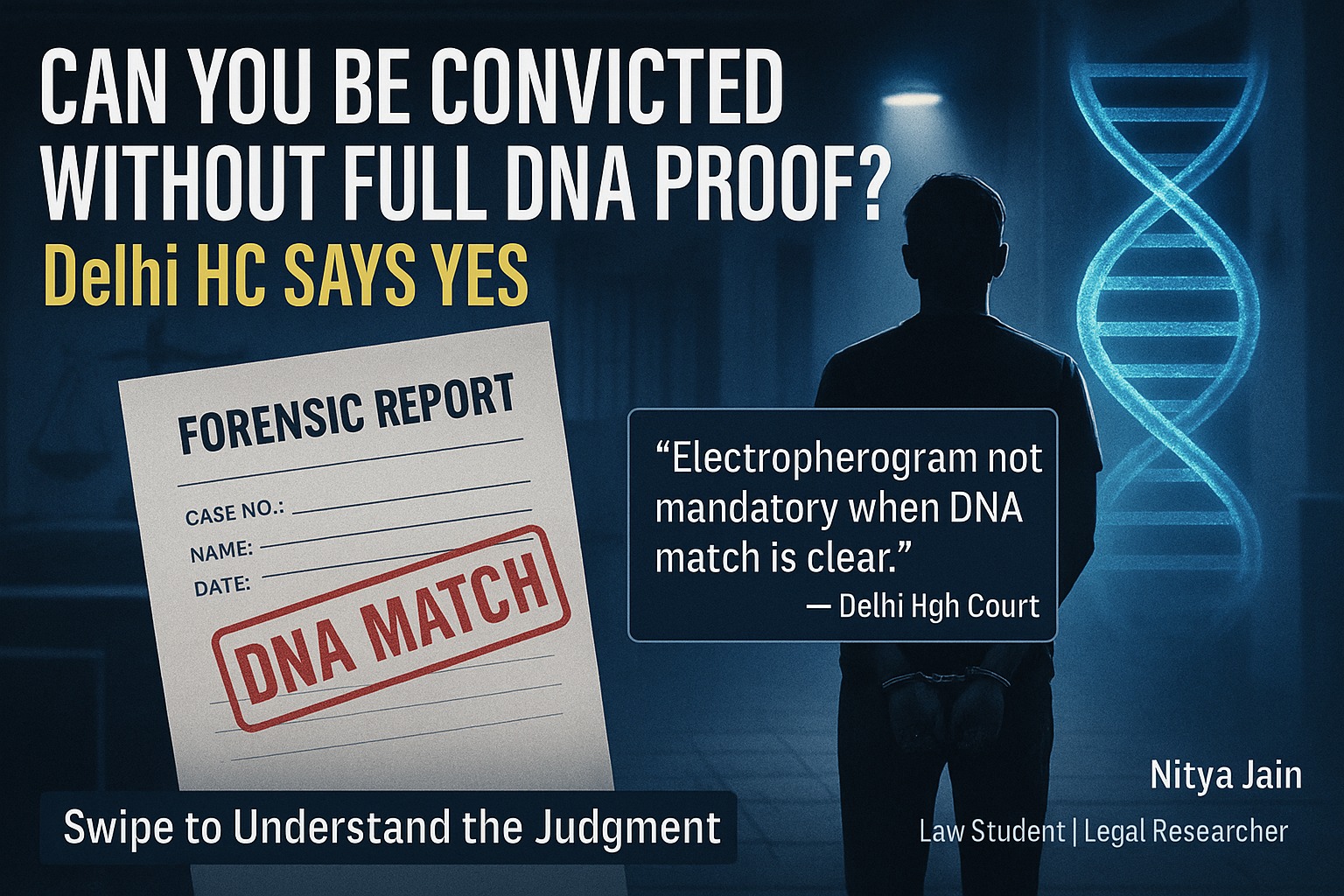Electropherogram Not Mandatory for DNA Reliability
Sanjay @ Sanju v. State (NCT of Delhi)
Criminal Appeal No.: CRL.A. 575/2018
Decided by: Justice Sanjeev Narula
Court: Delhi High Court
INTRODUCTION
The Delhi High Court recently upheld a 24-year-old man’s conviction for raping a 60-year-old woman in a landmark decision, holding that DNA evidence is still legally admissible in the absence of an electropherogram as long as it has a strong support by a legitimate allelic report and expert testimony. In Sanjay @ Sanju v. State (NCT of Delhi), Criminal Appeal No. 575/2018, the court reaffirmed the survivor centric and forensic friendly approach to decide sexual offences.
Facts of the Case
The accused lived nearby the victim 60 year old woman who he sexually assaulted in her jhuggi in 2014. The main foundation of the accused case was the evidence of the DNA found in the victim’s clothing which matched the accused DNA. The DNA profile served as the main foundation for the prosecution’s case. Sanjay @ Sanju was found guilty under Section 376 IPC by the trial court and given a 12 year rigorous prison sentence. The accused however filed an appeal with the High Court.
Accused in the appeal stated that the DNA match was unreliable due to its scientific incompleteness. He claimed that the DNA report was inadequate, mainly due to the absence of the electropherogram, a graphical depiction of DNA sequencing, along with the allelic data.
Court’s Reasoning
While rejecting the appeal, Justice Sanjeev Narula made it clear that if the allelic report is understandable, supported by scientific analysis and properly endorsed by an expert witness, an electropherogram is not required as part of DNA evidence. The court stressed that a scientific officer from the Forensic Science Laboratory has already provided adequate support for the forensic report in this case, while the defence did not present any expert and the defence did not present any expert testimony or evidence to refute the same.
The court stated that it is not required to submit every technical detail as such the electropherogram every single time, especially where there is no accusation as to procedural error or tampering. The court further made it clear that the forensic evidence must follow the procedure as well as the court must take a neutral balanced stance ensuring that the findings are neither blindly accepted nor technicalized.
Victim Testimony and Context
The court further stated that there is a need to look into the matter with a context sensitive less rather than the overly technical one in the case of sexual violence especially when the older victims or the vulnerable communities are involved. Minor inconsistencies in the victim’s statement like the room’s description or the neighbour’s reaction, were also noted by the court which reiterated that they do not call into question the survivor’s story’s overall veracity.
Significance
This ruling stands as a landmark judgement regarding the DNA admissibility as in the court stated that formats like electropherograms are not required, in the case here procedural scientific integrity is analysed and maintained. This case further strikes a balance between victim protection, scientific reliability and due process, ensuring the judgment is just, fair and not arbitrary in nature.
ABOUT THE AUTHOR
NITYA JAIN is a first year BBA LLB student at Symbiosis Law School, Pune. She is a certified legal researcher by Manupatra. She has an interest in Public service, research, drafting. She has done various legal internships and looks forward to doing more. Her interest lies in corporate law, International law and Intellectual Property Law.

